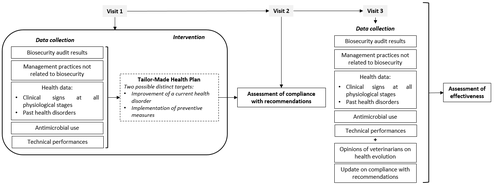
GOMES Carla
Recommendations: 0
Review: 1
Review: 1

Combining several indicators to assess the effectiveness of tailor-made health plans in pig farms
Evaluating tailor-made health plans in pig farms: a multiple complementary indicators approach
Recommended by Matteo Chincarini based on reviews by Carla Gomes and 1 anonymous reviewerTailor-made health plans for farming animals, including pigs, are highly beneficial due to their customized nature, addressing the unique needs of each farm and promoting efficient husbandry practices. However, assessing the effectiveness of individualized approaches can be challenging. Levallois et al. (1) tackled this challenge by evaluating the effectiveness of tailor-made health plans of pig farms based on a systematic biosecurity and herd health audit. The study involved twenty farrow-to-finish pig farms, each receiving specific plans tailored to their specific needs. Compliance with the recommendations was monitored over an eight-month period. In the literature, various studies have delved into specific issues in detail, such as disease incidence (e.g., (2)). However, the authors of this research applied a comprehensive approach through an integrative analysis of multiple complementary indicators to provide an effective evaluation of the changes and health disorders.
The authors' holistic approach to measuring the effectiveness of tailor-made health plans is noteworthy. They employed up to seven methods to identify advantages and limitations, providing valuable insights for applied research and practitioners in the field of farm animals. Additionally, the study's inclusion of diverse farms, ranging from conventional to antibiotic-free and varying in sow breeding numbers (from 70 to 800), demonstrates the flexibility of the proposed approach, accommodating different farming systems.
The study revealed three crucial considerations for future evaluations of tailor-made health plans. Firstly, placing compliance as the primary assessment indicator is a priority. Secondly, it is essential to tailor outcome indicators and monitoring periods according to each farm's specific health disorder. Lastly, a comprehensive understanding of the health disorder's evolution can be achieved through the amalgamation of multiple indicators.
While the study does have limitations, such as the relatively short time window for assessment, the methodological framework and results are promising. Further, the discussion of the results raises several areas worthy of future investigation to improve compliance and address farmers' hesitations towards action (i.e., lack of willingness). More research in this context will be beneficial for veterinarians and practitioners, enhancing their understanding and positively impacting both farmers and animals.
In conclusion, the study underscores the significant impact of tailor-made health plans on promoting positive changes in farm management. Assessing the effectiveness of these plans enables the refinement of new strategies and enhances the overall quality of work in animal production. The study by Levallois et al (1) sheds valuable light on the challenges and potentials of such plans, providing essential insights for pig farming practices. While further research and improvements are necessary, the study strongly emphasizes the pivotal role of individualized approaches in attaining improved farm management and enhancing animal welfare.
References:
1. Levallois P, Leblanc-Maridor M, Scollo A, Ferrari P, Belloc C, Fourichon C. (2023). Combining several indicators to assess the effectiveness of tailor-made health plans in pig farms. Zenodo, 7789634. ver. 3 peer-reviewed and recommended by Peer Community in Animal Science. https://doi.org/10.5281/zenodo.7789634
2. Collineau L, Rojo-Gimeno C, Léger A, Backhans A, Loesken S, Nielsen EO, Postma M, Emanuelson U, grosse Beilage E, Sjölund M, Wauters E, Stärk KDC, Dewulf J, Belloc C, Krebs S. (2017). Herd-specific interventions to reduce antimicrobial usage in pig production without jeopardising technical and economic performance. Preventive veterinary medicine, 144:167-78. https://doi.org/10.1016/j.prevetmed.2017.05.023